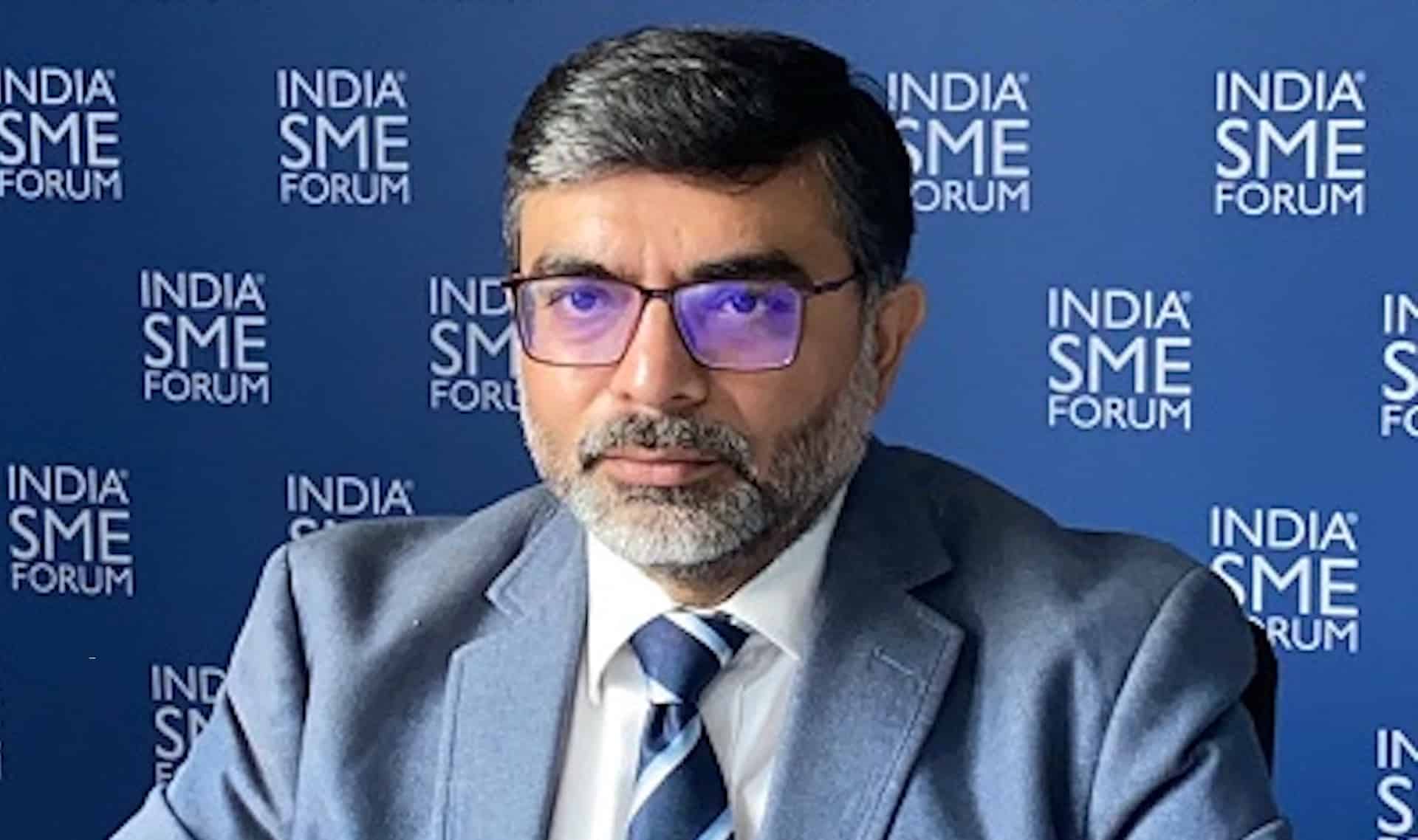MSME
India’s small entrepreneurs are now going global: ISF’s Vinod Kumar
India SME Forum (ISF) is a non-governmental organization founded in 2011 with the objective to propel a Small and Medium Business Movement across the country. It aims to provide a voice to small and medium entrepreneurs, advocate changes to the entrepreneurial ecosystem and to support and recognise innovative, globally competitive, SMEs in India.
The Forum is a gazetted member of India’s National Board of MSME, the apex MSME Statutory Body, since 2015, a Member of the High Powered Monitoring Committee of the National SC/ST HUB under Stand Up India and a Member of the RBI’s Standing Advisory Committee on Flow of Institutional Credit to MSME Sector, apart from contributing to various national and international think tanks, on the MSME Entrepreneurial ecosystem.
In this exclusive interview The Plunge Daily, Mr. Vinod Kumar, the honorary president of ISF, talks about the vision of the organization, its awards for entrepreneurs and how it is working with the government to benefit thousands of small traders in the country.
Q) When it comes to the role of the India SME Forum, can you please elaborate on the intention behind establishing ISF?
When the MSMED Act was passed in 2006, we were elated, but the focus was still not there and there was not much of a development in the ecosystem for the MSME sector, so we realized a serious intervention was needed and established India SME Forum to act as voice and propel a Small and Medium Business Movement across the country. Starting out with 400 members in 2011, today we have over 97,000 MSMEs as members, 270+ Sectoral, regional associations as supporters and international network organizations as partners. Our aim is to advocate changes to the entrepreneurial ecosystem and to support and recognise innovative, globally competitive, SMEs in India. We have a valued country wide network of over 250 advisors, consultants, experts and mentors.
As part of our mission, we share best practices, information and knowledge as well as seek and recognise MSMEs who have exhibited great success in leading their enterprises, creating much needed employment, enabling a sustainable ecosystem and catapulting their enterprise to the next stage. We specialize in effecting policy changes as well as execution & implementation partners for govt. organized initiatives for micro, small & medium enterprises.
Q) Where do you think India’s future of entrepreneurship and entrepreneurial development is? How does ISF plan to help in this process?
India is now becoming a hub for start-ups over the recent years due to high growth rates. India’s entrepreneurs are now going global and become successful. They are not only benefiting themselves, but they are also generating an unprecedented number of jobs in the market. Many entrepreneurs like to work in information technology, manufacturing, finance, software, green energy, waste management, transportation and many other sectors to harness opportunities. The number is likely to increase in the future due to the high availability of manpower and better government policies.
Employment creation is one of the biggest challenges India is facing right now, but the unique and promising demography of India has immense potential to develop, innovate, raise entrepreneurs, and create employment for the youth. There are several reasons why the start-up ecosystem is booming in India such as emerging markets, increased political will and government support, technological innovations and changing perception towards entrepreneurship, etc. India SME Forum shares knowledge with the entrepreneurs through several initiatives, workshops, seminars, etc. We also recognize the hard work of entrepreneurs and felicitate them for their outstanding efforts and achievements, which motivates them and other entrepreneurs to reach new heights.
Q) We all know India’s vision of becoming a trillion-dollar digital economy. So how can small businesses participate in driving that vision?
India’s micro, small and medium businesses play a crucial role in running the economy and providing jobs in the country. Among the 63 million MSMEs, 98 percent are micro. Almost everyone is hugely dependent on them for some needs or the other. Around 50 percent of the total MSMEs operate in rural areas and provide 45 percent of the total employment. About 97 percent of the total employment in the MSME sector comes from the micro segment.
As we know, the IT industry is one of the biggest sectors in India, it directly employs almost 51 lakh people in FY 2021–22. In addition, other economic sectors have seen a significant increase in chances for occupations with digital capabilities.
Q) What are the ongoing changes in the industry that a small business has to definitely focus in today’s times?
After Covid, Indian industries are focussed on the growth velocity to secure every opportunity coming their way and in the process, digitize. The proliferation of the internet with the launch of the Digital India movement in 2014 and the digital adoption accelerated by Covid-19 in many ways will help India become a trillion-dollar digital economy
According to MeiTY Digital India report 2020, facilitating end-to-end supply chains, e-enabled trade, and e-commerce to reach all Indian consumers and producers, link small retailers to digital value chains and improve inventory handling efficiency, which has shown gains upto 20 percent in pilots in the private sector. Scaling this initiative to reach 60 to 80 percent of India’s supply chains could generate additional economic value of $5 billion to $10 billion in 2025.
Beyond economic value, millions of digital professionals and workers in small and medium-size enterprises and the farm sector can gain access to better livelihood opportunities.
Q) What are the major challenges in the way of growth of SMEs in India?
MSMEs had an unmet credit gap of $300 billion in 2011, and this is likely to rise to $800 billion by 2025 on the basis of past momentum. The paucity of financial records and verifiable credit histories is a major factor that has impeded the flow of credit to MSMEs. Going forward, India’s small businesses are poised to generate a large volume of data through online interactions; the GSTN, for example, could universalise online sales invoicing, the use of digital payments, greater participation on e-commerce sites and online procurement portals.
The Ministry of Micro, Small and Medium Enterprises could set up a single body to solve data availability issues for MSMEs by making government data available digitally, designing architecture for data sharing, and building supporting infrastructure like APIs, data security, and consent architecture. Policies set up by the Ministry of Finance and Ministry of Micro, Small and Medium Enterprises would also be required to encourage the Udyog Aadhaar–based eKYC anti-money-laundering database and consent architecture for businesses.
Beyond providing services to individual consumers, a range of small and medium-size enterprises (SMEs), including women entrepreneurs working from their homes, can become service providers using high-quality video calls to learn new skills, access e-commerce platforms, and build remote relationships with suppliers and customers.
Q) COVID-19 impacted all sectors, and despite the crisis we experienced, SMEs can adapt to digitisation to recover, increase market share and grow. In that context, how important is the role the e-commerce sector is playing in driving its digital journey?
The pandemic caused severe disruptions in the MSME sector, especially in the manufacturing segment. A SIDBI study found that 67 percent of MSMEs surveyed reported temporary closure for up to a three-month period during COVID in the financial year 2020-21.
Despite the Covid shock, MSMEs that integrated with e-commerce platforms experienced an increase in sales, turnover, and profits and had an advantage over those that did not have online presence. Online channels of sales helped MSMEs sustain their businesses, moreover, there was an 80 to 90 percent increase in seller registration. Thus, digitalisation turned out to be a coping mechanism during the pandemic.
In our quest to achieve a $5 trillion digital economy, we should boost digitalization, push inclusivity in ways that support MSMEs, ensure GST parity and empower small businesses to venture into the online ecosystem. MSMEs cutting across domains have shown a tremendously positive shift towards the e-commerce ecosystem. It goes without saying that e-commerce was one of the pillars that helped MSMEs sustain and survive the Covid-19 pandemic.
Q) Can you please highlight the best practices from online retail that can be used in offline retail to give rise to hybrid models of business?
According to the Global Payments report, the Indian e-commerce sector is expected to grow 21 percent annually over the next four years. Now, a new hybrid commerce model is emerging that combines the power of online commerce backed by data analytics with offline stores, essentially helping them operate as a physical manifestation of their online experience.
Deploying in-store tools to automate operations and enhance efficiency by providing data insights such as real-time visibility of inventory, lead management, and customer relationship management can help businesses not only provide better services, but also gather inputs for understanding purchase patterns and improve store planning.
Personalisation is an important way to attract and retain customers, especially when it comes to online commerce. Using 360-degree customer profiles to build targeted and personalized marketing campaigns can help attract paying customers. Offline, in-store activities such as contests, interactive product demos, service camps, and instant gratification offers such as discounts and cashback can also keep customers coming back for more. Smarter pricing models can actually offer an improvement in gross margins. Customers are willing to pay an incremental cost if brands offer personalized experiences and perks like faster deliveries. Interactive kiosks support both touch and voice techniques and can help customers get exactly what they are looking for from the store.
Q) So, we have heard about India SME Forum’s Best Sellers awards. Can you please help us and explain the importance of organizing such awards?
India SME Forum is looking forward to assimilating Best Practices of Retail in line with the VUCA Economy to support millions of retailers. The Best Sellers of India Awards, will be presented to outstanding retailers, on a zonal basis, who have adopted the latest technologies, credit facilities and digital solutions to serve the interests of the consumers while recording growth and overcoming the challenges during the pandemic. Winners will be felicitated in the presence of union and state ministers, leaders and visionaries representing the retail industry in India.
The awards will be judged by a renowned jury which includes former bureaucrats and dignitaries such as Mr. Amar Patnaik, Member of Parliament, Rajya Sabha, Mr. Dhanendra Kumar, IAS, Former Chairman CCI, India’s ED in World Bank, Secretary GOI, Dr. Aruna Sharma, retd. IAS, Former Secretary, Steel and MeitY, Mr. Ramesh Abhishek, retd. IAS, Former Secretary, DPIIT, among others. We hope such awards will boost the motivation of the retailers to adapt into the digital era and help the MSMEs to sustain their business.
Q) How does ISF recognize best sellers among small business owners and their contribution? Please explain the process for shortlisting and evaluating the smart sellers for the ISF’s award.
India SME forum commenced India SME 100 Awards in the year 2012 and since then it is organized every year. We have over 40,000 nominations year after year. In the year 2012, we at India SME Forum had worked with research companies to develop a mechanism and an algorithm to rank companies on different parameters which are still used by us to shortlist & judge the MSMEs. For the Best Sellers of India Award, we will be shortlisting and evaluating the retailers on the basis of numerous base & secondary indicators such as; growth performance, financial soundness, future proof orientation, digital journey which are the base indicators and secondary indicators are; innovation & disruption, people capital, internal & external processes & customer experience.
Q) What are the best practices that hybrid/omnichannel retail stores can provide?
Today, omnichannel retail has become the normalized way of shopping with customers switching between multiple touch points. In the past, customers would simply walk into a brick-and-mortar store to browse and purchase. Now, customers have mobile phones, iPads, and laptops to help them compare products and services. They may check out a product in a physical store but end up buying it online or vice-versa. The benefits of a unified retail strategy across online and offline channels are out there to see. You need to be cutting-edge about it and refine your practices to beat competition and cater to modern day customers who exhibit complex shopping behaviors.
Q) On the lines of the work done by ISF, how do you think the government can foster and encourage innovation among small business owners in India?
Government can give a rebate on expenditure of R&D & offset expenses incurred for prototyping, designing as well as producing commercially viable products. Apart from this, governments around the world conduct competition & hackathons for innovative products in all sectors of priority & investing in such shortlisted & innovative innovations. Digital technology can significantly enable India’s MSME segment, provided the emerging infrastructure has joint buy-in from the government, solution providers and importantly users.
Angel investors play a critical role in addressing the financing needs of entrepreneurs. Measures in the budget to help angel funding can become more accessible and rewarding for angel investors will unlock investments of patient or risk capital in startups.














